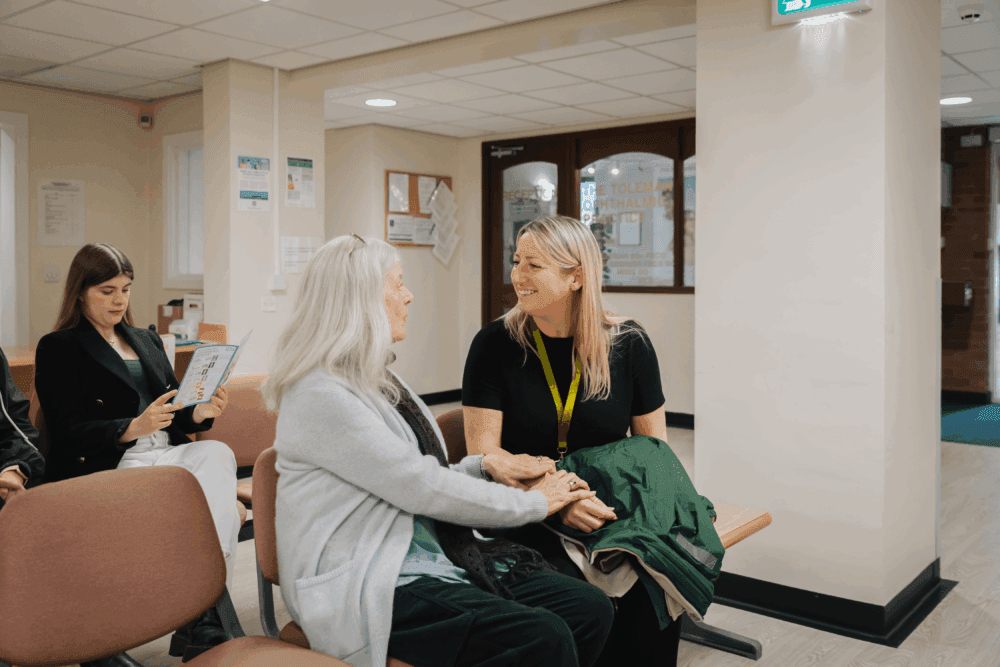Arranging transport to and from hospital for older people

Hospital visits
Older adults tend to spend more time visiting hospitals than other age groups, whether due to long stays for treatment or for outpatient appointments. Regardless of the reason, many older adults struggle to navigate and obtain transport for this. Here, we are exploring the challenges they may face accessing hospital transport, what NHS services are available, alternative private hire options, community transport schemes that could help, how families and professional home carers could assist with hospital visits, and useful resources if you need to arrange upcoming hospital transport.
At Home Instead, our aim is to help people age positively and in place by bringing expert care to their home. For nearly 20 years, we have been providing the highest standard of care, and creating industry-leading training programmes for our Care Professionals that are accredited by nursing and medical professionals. Today, we are the world’s largest global domiciliary care network, supporting over 100,000 older adults with personalised, tailored care at home. So whatever questions you have about hospital transport for older people, we can help.

Why might an older person need transport to hospital, and what challenges do they face?
Older people may need transport to and from hospital for a number of reasons, including routine medical appointments, specialist treatments running over a number of days, weeks or months, or in emergencies. Many health conditions require occasional or frequent hospital visits depending on their severity, such as arthritis, diabetes, cancer, and more.
Age UK’s 2018 Painful Journeys report found that of those aged 65 and over who had been to a hospital appointment within the previous year (for themselves or to support a loved one), 26% said there was no public transport available to get them to the appointment on time, while 26% also said they would be unable to attend hospital appointments if family and friends didn’t drive them there. Further research found 1.45 million older people aged 65 and over said they find it quite difficult or very difficult to travel to a hospital.
The reasons for these difficulties vary depending on the severity of their health conditions, and their personal circumstances, but in general:
- Many older individuals no longer drive or have access to a private vehicle, which makes independent travel more of a challenge.
- Those who live alone or in rural areas find transportation options are limited.
- Of the public transport options available, these can pose additional challenges for older people; buses and trains can be difficult to access due to high steps, crowding, or long walks to stops, and navigating the transport schedules and routes can be confusing for those with cognitive decline or conditions like dementia.
- Those with mobility issues (which affect 35% of people over 70, and most people over 85) find getting to and from hospital is more challenging, uncomfortable and worrying.
- In the UK, many non-emergency patient transport services are overburdened, which can cause delays for those using them to access appointments taking place at specific times. This could lead to missed appointments, delayed treatments, and as a result, worsening health conditions.
“To get to hospital, I take three buses, which takes three hours, but over this last year, it has been too stressful to use the buses. My condition gives me awful balance, so I’m always falling over. With my arthritis I can only walk very small distances so it’s painful walking between buses.”
– 79 year old patient via Age UK
By improving access to hospitals for older adults, this can make appointments and checkups much easier, and avoid the risks involved in travelling alone via public transport or by car. Overall, this can improve their quality of life significantly. While improvements certainly need to be made in the UK, it is important to understand your current options and how to access them, so you can always get to and from hospital when you need to.
What options does the NHS offer for hospital transport?
The NHS offers a number of patient transport services depending on the type of appointment you have.
Emergency Transport – 999
The first thing to note is that, in the event of an emergency you believe requires an urgent visit to the A&E department, you should always call 999. When you call, an ambulance will be dispatched to pick you (or the ill person) up wherever you are and take you straight to hospital. An example of this might be if you fall and injure yourself.
If a situation is not considered an emergency, you will usually be expected to make your own way to hospital for whatever you need.
Non-Emergency Patient Transport Services (NEPTS)
The NHS offers Non-Emergency Patient Transport Services (NEPTS) supported by St. John’s Ambulance Service, which is designed for patients who need assistance getting to and from hospital appointments, and who cannot use public or private transport options due to health-related mobility issues or specific medical needs. This is available for pre-planned, non-emergency hospital visits, such as an outpatient appointment, a dialysis appointment, or a routine treatment.
This service is estimated to deliver more than 11 million patient journeys every year, and covers around half a million miles every weekday. Of these journeys:
- Around half are for outpatient appointments
- Around one third are for dialysis appointments
- Around one fifth are for supporting hospital discharges, transferring to other hospitals or for other reasons
Availability of Non-Emergency Patient Transport Services can vary depending on region and demand, and eligibility is assessed based on a person’s medical needs, for example, if they need medical care, monitoring, or supervision during their journey to and from hospital, or if they have a physical or mental health condition preventing them from safely travelling in another way, and require a specialised form of transport such as a wheelchair-accessible vehicle. Those who are able to use public or private transport, or who have family members or carers who can help them, may not qualify for this service.
If you are unsure whether you qualify for Non-Emergency Patient Transport Services, speak to your GP about your needs, any struggles you have when visiting hospitals, and the options available in your area. If you have a hospital referral letter, you may also be able to contact the number given to ask about transport options.
Keep in mind that whatever type of transport you use, you will need to be taken home after you are discharged. This mode of transport will depend on the outcome of your visit. For example, if you make a full recovery and it is safe enough, you could have a family member or friend take you home. Or, if you require additional care at home or are to be transported to a care facility, you may need to arrange a non-urgent ambulance to transport you. The hospital team responsible for your discharge can help you arrange this.
Other Options
Of the categories mentioned above, category 4 offers the reimbursement of travel costs, which could be an option for you if you do not have any specific medical needs to qualify you for Non-Emergency Patient Transport Services, but you are receiving certain benefits and cannot afford the ongoing costs of recurring hospital visits.
If you have been referred for specialist NHS treatment or tests, you may be able to claim for the reimbursement of any cost you incurred organising transport to or from hospital through the Healthcare Travel Costs Scheme (HTCS). You can learn more about this option, whether or not you are eligible, and how to make a claim, on the NHS website.
If you need to make regular hospital visits, such as for cancer treatments or ongoing dialysis, there could be options available that enable you to receive discounts on the cost of parking. Hospital parking can add up if you are visiting regularly, so this can be a big help. You may be able to get long-term parking passes, or to be reimbursed for your parking, so speak to your GP or the hospital about this.
In addition, if you plan to travel on public transport to a hospital appointment, you may be able to request a weekly or monthly season ticket through the individual transport companies to reduce costs. In many cases, older adults and disabled people can receive discounted travel through this, so it is certainly worth looking into if you know you have many hospital appointments coming up, and it is safe enough for you to attend using public transport.
Are there private hire options available?
In the UK, there are various private hire options available for older adults who need to get to hospital. These can sometimes be more reliable than community options or Non-Emergency Patient Transport Services, and could be important for those who are ineligible for these services. Depending on the option you choose, they could offer:
- Physical assistance for those with mobility issues or special medical needs
- Wheelchair-accessible vehicles, such as taxis or buses equipped with ramps or lifts
- Drivers trained in first aid and safe handling techniques, and who know the signs to look out for in those with health conditions
These services could ensure a safer and more comfortable journey for older passengers, and can make a big difference to the peace of mind of those with complex health conditions who may require extra assistance during travel.
While private hire services can be a more flexible and convenient option, they are often expensive, especially if you have multiple appointments to go to each week or month. This may not be affordable for all, so it is helpful to start by asking your GP or calling your local council to find out what may be available for your specific circumstances.
If you do decide to go with private options, make sure you speak to them about your needs beforehand and ensure they have the appropriate equipment, vehicles and training for what you need. You may want to ask about their driver training and background checks, if they are registered with the Care Quality Commission (the governing body for quality of care), and check testimonials from others who have used their service in the past. You could also take a loved one with you for the first journey so they can advocate for you and ensure the service is the best option.

What about community transport schemes?
As hospital transport options are sometimes limited for older people, many community transport schemes exist to fill the gaps in these services, and they play an important role for those who struggle with mobility or cannot access private vehicles. These schemes are usually run by either local councils or by charities, and although some may still require a fee or the petrol costs, this can often be more affordable than private hire services.
Many are operated by volunteers with the appropriate training through charities or not-for-profit organisations who have access to specialist vehicles–such as wheelchair-accessible buses–to accommodate specific mobility issues. Volunteer drivers are also usually trained to be able to provide the required support, ensure the safety and comfort of older passengers, and to take the appropriate steps in the case of an emergency.
Examples of these schemes include Dial-a-Ride buses, or local volunteer driver programs. These community initiatives can also help to reduce the loneliness and isolation often experienced by older adults, which can be compounded by the mental health issues associated with ongoing treatments and health struggles. Some local councils may also offer befriending schemes, where a volunteer companion will travel with the older person to provide support and reassurance.
The best way to find these community-based offerings is to speak to your GP or to call your local council to find out what options may be available. In certain areas, the Royal Voluntary Service can also connect older people with local volunteer drivers through their Home from Hospital service, and Age UK runs a door-to-door transport service for older people that could help. Age UK also has a general information line which may be able to point you in the right direction, and you can call this any day of the year from 8am to 7pm on 0800 678 1602.
How can I help an older loved one with hospital transport?
Hospital transport often requires careful planning and coordination, so it is important to consider that your older loved one may need help with this, whether this means practical help, reminders or emotional support. If you want to help them, you could:
- Check their appointment schedules in advance to make sure they are organised and avoid last-minute arrangements or missed appointments
- Encourage them to speak to their GP, hospital contact or local council to ensure they have collected all the information about their available transport options
- Help them to plan transport early by calling the appropriate services and asking the right questions, particularly if they have specific mobility issues or health needs
- Help them to find a reputable and appropriate private transport option that can offer what they need
- Ensure they have the necessary documents and resources for their appointment, such as referral letters, travel passes (if applicable), and mobility aids
- Attend appointments with them if you are able and have the time, by driving them there if you think it is safe to do so, or accompanying them on public transport
- If you cannot attend appointments, check in on them before, during and after their journey to make sure everything goes as planned
- Organise for a professional home carer to transport them or accompany them to appointments
- Organise reablement care for after they return from hospital, if needed (you can learn more about this in our guides to reablement care, and after hospital care)
How can professional home carers help with hospital transport?
Professional home carers can be a helpful resource for older adults who may struggle in various ways to attend hospital appointments, as they can provide both practical assistance and emotional support throughout the experience. Professional carers can often assist with booking, organising transport and preparing for medical appointments in advance, whether this happens through the NHS services, private hire vehicles or community transport schemes – a professional carer may also be able to assist in doing the necessary research to find out what services an older person in their care may be entitled to, if any.
Having a carer coordinate pick-up and drop-off times can make the person feel supported and safe throughout the experience, and if carers can also accompany them to appointments to offer support, this can be especially helpful for individuals with mobility issues, cognitive impairments, or those who feel anxious about going alone. For both the older person and their loved ones, this can provide much-needed peace of mind, while ensuring a smooth, timely, convenient process.
At Home Instead, we can provide highly trained Care Professionals who are experienced in helping older adults while at home, and while out and about attending hospital appointments. We’re an award-winning home care provider and part of a worldwide organisation devoted to providing the highest quality relationship-led care for older people in their own homes. Arranging care for yourself or your loved one shouldn’t be stressful, so whatever questions you would like answered, feel free to reach out to the Home Instead team to discuss your needs.